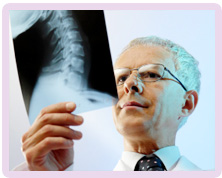What is Cauda Equina?

Cauda Equina Syndrome is a significant compression of the nerves in the lower section of the spinal canal. If left untreated it can lead to permanent loss of bowel and bladder control and paralysis of the legs, and as such is considered to be a surgical emergency.
Causes of Cauda Equina
Cauda Equina involves a compression of the nerve roots below the level of the spinal cord, which can be caused in a number of ways:
- Traumatic injuries;
- Herniated Disk (spinal disks that have slipped or prolapsed);
- Tumours;
- Spinal Stenosis (narrowing of the normal front to back distance of the spinal canal);
- Inflammatory Conditions (such as Paget's disease and ankylosing spondylitis);
- Infectious Conditions;
- Accidental Medical Causes (including lumbar puncture, poorly positioned screws, and continuous spinal anaesthesia);
Symptoms of Cauda Equina
Symptoms of Cauda Equina include the following:
- Pain in the lower back;
- Pain in either one leg or both legs that starts in the buttocks and travels down the legs;
- Numbness in the groin;
- Bladder problems (including an inability to urinate, urinary hesitancy, decreased urethral sensation and incontinence);
- Bowel disturbances (including constipation, loss of anal tone and sensation, and incontinence);
- Lower extremity muscle weakness and loss of sensation;
- Reduced or absent lower extremity reflexes.
Cauda Equina can be difficult to diagnose as back pain or bladder and bowel problems have a number of possible causes, and can in fact be urinary tract infections or diabetes. Consequently, a physical examination is often needed to determine whether a patient is suffering from Cauda Equina. This includes:
- testing muscle strength of the lower extremities;
- evaluating sensation to touch and pain, especially around the groin and perineum;
- checking the lower extremity reflexes;
- evaluating rectal tone, sensation, and reflex.
After this medical examination and considering the patient medical records, the 'red flag' symptoms medical professionals should spot so as to correctly diagnose Cauda Equine Syndrome are:
- Severe low back pain;
- Sciatica;
- Saddle and genital sensory numbness;
- Bladder, bowel and sexual dysfunction;
- Has not passed urine for 6 – 8 hours.
There are two stages of Cauda Equina Syndrome: complete and incomplete. Where it is incomplete the patient has one or more of the following symptoms:
- Altered urinary sensation;
- Loss of desire to void;
- Poor stream or the need to void.
Where the syndrome is complete, the patient experiences painless urinary retention and overflow incontinence.
Treatment of Cauda Equina
Considered to be a surgical emergency, those suffering from symptoms of Cauda Equina Syndrome should be treated immediately so as to improve the chances of full neurological recovery. In most cases, the necessary treatment is emergency spinal decompression, which relieves pressure on the nerves by removing the compressing structures and increases the space available for the nerves in the spinal canal. For those with a herniated disk, a portion of the bone surrounding the nerve is removed.
Other treatments for Cauda Equina include:
- Antiinflammatory agents (for inflammatory conditions);
- Antibiotics (for infectious conditions);
- Chemotherapy or radiation therapy (for tumours).
Delays in Diagnosis
It is important that Cauda Equina Syndrome is diagnosed as quickly as possible, as reports suggest that intervention less than 48 hours after the onset of symptoms produces a better outcome than intervention delayed for longer than this. In a study it was noted that of 47 patients having surgery within 24 hours, 87% recovered normal bladder function whereas, of 46 patients having surgery later than 24 hours, only 43% recovered normal bladder function.
However, delays in diagnosing and treating Cauda Equine Syndrome can occur, the most common reasons being:
- Patients who delay in seeking medical help;
- GPs not recognising the 'red flag' symptoms;
- Junior accident and emergency staff misdiagnosing the condition;
- Junior accident and emergency staff not calling for a consultant;
- Hospital delays in admission to surgical units and in arranging MRI scans and surgery within an appropriate period and conducted by a suitably experienced team;
- Deficiencies in after care.
Can We Help You With A Cauda Equina Enquiry?
Early legal assistance can be vital so please contact us if you would like to discuss your situation. Please call us free on 0800 234 3300 (or from a mobile 01275 334030) or complete our Online Enquiry Form.
Make An Enquiry
Why Choose Us
- Specialist medical negligence solicitors
- Free initial enquiries
- No win, no fee available
Reviews
"I would like to say a big thank you to you for making this whole process easy and relatively painless. You kept me informed throughout and you were always polite and courteous in all forms of communication. I would not hesitate to recommend you to friends and family, so a really big thank you and I wish you all the best in the future."
Mr A.
Helping Clients Across England & Wales

Free Medical Negligence Guide
'7 Questions You Must Ask Before Choosing A Medical Negligence Solicitor'


